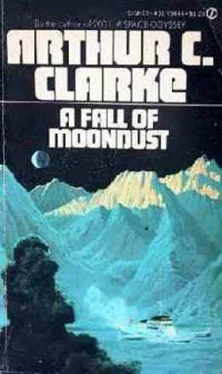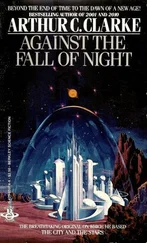Arthur Clarke - A Fall of Moondust
Здесь есть возможность читать онлайн «Arthur Clarke - A Fall of Moondust» весь текст электронной книги совершенно бесплатно (целиком полную версию без сокращений). В некоторых случаях можно слушать аудио, скачать через торрент в формате fb2 и присутствует краткое содержание. Жанр: Фантастика и фэнтези, на английском языке. Описание произведения, (предисловие) а так же отзывы посетителей доступны на портале библиотеки ЛибКат.
- Название:A Fall of Moondust
- Автор:
- Жанр:
- Год:неизвестен
- ISBN:нет данных
- Рейтинг книги:5 / 5. Голосов: 1
-
Избранное:Добавить в избранное
- Отзывы:
-
Ваша оценка:
- 100
- 1
- 2
- 3
- 4
- 5
A Fall of Moondust: краткое содержание, описание и аннотация
Предлагаем к чтению аннотацию, описание, краткое содержание или предисловие (зависит от того, что написал сам автор книги «A Fall of Moondust»). Если вы не нашли необходимую информацию о книге — напишите в комментариях, мы постараемся отыскать её.
A Fall of Moondust — читать онлайн бесплатно полную книгу (весь текст) целиком
Ниже представлен текст книги, разбитый по страницам. Система сохранения места последней прочитанной страницы, позволяет с удобством читать онлайн бесплатно книгу «A Fall of Moondust», без необходимости каждый раз заново искать на чём Вы остановились. Поставьте закладку, и сможете в любой момент перейти на страницу, на которой закончили чтение.
Интервал:
Закладка:
“And what, Mrs. Schuster, are you doing on the Moon?”
The witness smiled.
“That's an easy one to answer. They told me I'd weigh only twenty kilos here — so I came.”
“For the record, why did you want to weigh twenty kilos?”
Mrs. Schuster looked at Harding as if he had said something very stupid.
“I used to be a dancer once”, she said, and her voice was suddenly wistful, her expression faraway. “I gave that up, of course, when I married Irving.”
“Why 'of course,' Mrs. Schuster?”
The witness glanced at her husband, who stirred a little uneasily, looked as if he might raise an objection, but then thought better of it.
“Oh, he said it wasn't dignified. And I guess he was right — the kind of dancing I used to do.”
This was too much for Mr. Schuster. He shot to his feet, ignoring the Court completely, and protested: “Really, Myra! There's no need —”
“Oh, vector it out, Irv!” she answered, the incongruously oldfashioned slang bringing back a faint whiff of the nineties. “What does it matter now? Let's stop acting and be ourselves. I don't mind these folks knowing that I used to dance at the 'Blue Asteroid' — or that you got me off the hook when the cops raided the place.”
Irving subsided, spluttering, while the Court dissolved in a roar of laughter which his Honor did nothing to quell. This release of tensions was precisely what he had hoped for; when people were laughing, they could not be afraid.
And he began to wonder still more about Mr. Harding, whose casual yet shrewd questioning had brought this about. For a man who said he was not a lawyer, he was doing pretty well. It would be interesting to see how he performed in the witness box, when it was Schuster's turn to ask the questions.
CHAPTER 11
At last there was something to break the featureless flatness of the Sea of Thirst. A tiny but brilliant splinter of light had edged itself above the horizon, and as the dust-skis raced forward, it slowly climbed against the stars. Now it was joined by another — and a third. The peaks of the Mountains of Inaccessibility were rising over the edge of the Moon.
As usual, there was no way of judging their distance; they might have been small rocks a few paces away, or not part of the Moon at all, but a giant, jagged world, millions of kilometers out in space. In reality, they were fifty kilometers distant; the dust-skis would be there in half an hour.
Tom Lawson looked at them with thankfulness. Now there was something to occupy his eyes and mind; he felt he would have gone crazy if he had had to stare at this apparently infinite plain for much longer. He was annoyed with himself for being so illogical. He knew that the horizon was really very close and that the whole Sea was only a small part of the Moon's quite limited surface. Yet as he sat here in his space suit, apparently getting nowhere, he was reminded of those horrible dreams in which you struggled with all your might to escape from some frightful peril but remained stuck helplessly in the same place. Tom often had such dreams, and worse ones.
But now he could see that they were making progress, and that their long, black shadow was not frozen to the ground, as it sometimes seemed. He focused the detector on the rising peaks, and obtained a strong reaction. As he had expected, the exposed rocks were almost at boiling point where they faced the sun. Though the lunar day had barely started, the Mountains were already burning. It was much cooler down here at “Sea” level. The surface dust would not reach its maximum temperature until noon, still seven days away. That was one of the biggest points in his favor; though the day had already begun, he still had a sporting chance of detecting any faint source of heat before the full fury of the day had overwhelmed it.
Twenty minutes later, the mountains dominated the sky, and the skis slowed down to half-speed.
“We don't want to overrun their track”, explained Lawrence. “If you look carefully, just below that double peak on the right, you'll see a dark vertical line. Got it?”
“Yes.”
“That's the gorge leading to Crater Lake. The patch of heat you detected is three kilometers to the west of it, so it's still out of sight from here, below our horizon. Which direction do you want to approach from?”
Lawson thought this over. It would have to be from the north or the south. If he came in from the west, he would have those burning rocks in his field of view; the eastern approach was even more impossible, for that would be into the eye of the rising sun.
“Swing round to the north”, he said. “And let me know when we're within two kilometers of the spot.”
The skis accelerated once more. Though there was no hope of detecting anything yet, he started to scan back and forth over the surface of the Sea. This whole mission was based upon one assumption: that the upper layers of dust were normally at a uniform temperature, and that any thermal disturbance was due to man. If this was wrong…
It was wrong. He had miscalculated completely. On the viewing screen, the Sea was a mottled pattern of light and shade, or, rather, of warmth and coldness. The temperature differences were only fractions of a degree, but the picture was hopelessly confused. There was no possibility at all of locating any individual source of heat in that thermal maze.
Sick at heart, Tom Lawson looked up from the viewing screen and stared incredulously across the dust. To the unaided eye, it was still absolutely featureless — the same unbroken gray it had always been. But by infrared, it was as dappled as the sea during a cloudy day on Earth, when the waters are covered with shifting patterns of sunlight and shadow.
Yet there were no clouds here to cast their shadows on this arid sea; this dappling must have some other cause. Whatever it might be, Tom was too stunned to look for the scientific explanation. He had come all the way to the Moon, had risked neck and sanity on this crazy ride — and at the end of it all, some quirk of nature had ruined his carefully planned experiment. It was the worst possible luck, and he felt very sorry for himself.
Several minutes later, he got around to feeling sorry for the people aboard Selene.
“So”, said the skipper of the Auriga, with exaggerated calm, “you would like to land on the Mountains of Inaccessibility. That's a very interesting idea.”
It was obvious to Spenser that Captain Anson had not taken him seriously; he probably thought he was dealing with a crazy newsman who had no conception of the problems involved. That would have been correct twelve hours before, when the whole plan was only a vague dream in Spenser's mind. But now he had all the information at his fingertips, and knew exactly what he was doing.
“I've heard you boast, Captain, that you could land this ship within a meter of any given point. Is that right?”
“Well — with a little help from the computer.”
“That's good enough. Now take a look at this photograph”
“What is it? Glasgow on a wet Saturday night?”
“I'm afraid it's badly overenlarged, but it shows all we want to know. It's a blowup of this area — just below the western peak of the Mountains. I'll have a much better copy in a few hours, and an accurate contour map — Lunar Survey's drawing one now, working from the photos in their files. My point is that there's a wide ledge here — wide enough for a dozen ships to land. And it's fairly flat, at least at these points here, and here. So a landing would be no problem at all, from your point of view.”
“No technical problem, perhaps. But have you any idea what it would cost?”
“That's my affair, Captain — or my network's. We think it may be worthwhile, if my hunch comes off.”
Читать дальшеИнтервал:
Закладка:
Похожие книги на «A Fall of Moondust»
Представляем Вашему вниманию похожие книги на «A Fall of Moondust» списком для выбора. Мы отобрали схожую по названию и смыслу литературу в надежде предоставить читателям больше вариантов отыскать новые, интересные, ещё непрочитанные произведения.
Обсуждение, отзывы о книге «A Fall of Moondust» и просто собственные мнения читателей. Оставьте ваши комментарии, напишите, что Вы думаете о произведении, его смысле или главных героях. Укажите что конкретно понравилось, а что нет, и почему Вы так считаете.












